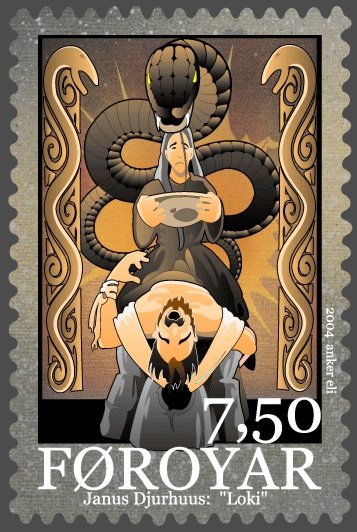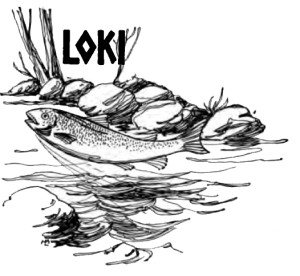 Loki confronts us with the inevitability of loss. The awesome tragedy that each of us confronts every day. Loki is an advocate for the gravity of grief in our lives; for without gravity, how would there be life on earth? How would the planets orbit the sun? The very structure of our cosmos would be as nothing without gravity; so too the very structure of our consciousness would be nothing without grief and loss.
Loki confronts us with the inevitability of loss. The awesome tragedy that each of us confronts every day. Loki is an advocate for the gravity of grief in our lives; for without gravity, how would there be life on earth? How would the planets orbit the sun? The very structure of our cosmos would be as nothing without gravity; so too the very structure of our consciousness would be nothing without grief and loss.
Sometimes Loki is the catalyst of loss; sometimes he is merely its herald, even its scapegoat. Many times, he serves as the gods’ wild card: get out of loss free. His manipulations, for example, ensure that the gods get walls built around Asgard at no cost; they drive a bargain with a giant to do the work, yet on seeing that he will meet their deadline and collect his payment (Freya, no less!), the gods enlist Loki to sabotage the process. And he does, most assuredly.
One wonders, therefore, whether the embrace of loss is the antidote to loss. Our fear and loathing of loss: perhaps this is the opening through which loss seeps its cold and deadly waters into our soft and vulnerable hearts. Loki challenges us to have a more conscious relationship to loss; our vilification of him as a symbol of the inevitability of loss is merely a function of our own lack of character.
In meditation we find it helpful to learn to observe the phenomena of our experience without indulging in the habit of attaching our identity to them. Not “my breath,” or “my sensations.” No, rather it is the breath, the sensations to which we turn the lens of our awareness. The self begins to wash away, yet nothing is lost but the illusion of the same. We find ourselves instead to be integral threads in the infinite tapestry of Wyrd – and nothing more. Yet…this is everything, for that is what we are.
Ah, so then Loki is a god of meditation, awareness, enlightenment, the sacred oneness and difference of all things. Perhaps in this light he is enlightenment’s ardent advocate, its patient and persistent provocateur. Enlightenment not in the misunderstood notion of somehow shedding the physical. No, enlightenment in a more true sense, the shedding of the illusions held about the physical, and about the beholder of the physical.
In the window of enlightenment there is a knowing and loving embrace of that which is – known in the perfect and irrefutable medium of direct personal experience. When we come to separate the carapace of ego from the endlessly flowing experience of sensation that is the body, we find that we begin to release ourselves from reactivity. We begin to respond to the flowing current of temporality. As such, in stepping back, we step forward and live with unprecedented fullness.
It is this fullness to which Loki wishes to seduce us. Yet we cannot achieve it so long as we are ruled by our fear of loss. So Loki goes to work, admittedly with a toolkit of strategies that shows mixed effectiveness. And he is stigmatized, hated, scapegoated for it. We believe we must protect ourselves from him; yet ultimately what are we protecting but the illusion of control? The illusion of knowledge? The illusion of certainty? The illusory notion that we can have honesty without a sense of irony woven through it?
Yet I would not dream of trivializing loss. It is a profound doorway for Mystery – for Runa meant in the fullest, broadest sense – to announce herself in our lives. And as such, it’s means are often profoundly hurtful. We have to be kind to ourselves first and foremost, for if we are infinite we are also crushingly finite. Those of us who truly know loss know that some wounds can never be healed; we can only learn to live with them, in an armistice that we can never entirely trust. And yet just as there is no limit to attachment, there is also no limit to liberation.
As such, to sit in judgment over those who judge Loki is itself a denial of loss, a denigration of human vulnerability. Which would stand against all that Loki is; would stand against the central column of Odin’s mysticism too, the embrace of vulnerability ,of death, on the tree of the world. To sit in judgment on the judgers is to become one of them. If we sit in judgment in Loki’s name then so much the worse – now we are not only hypocrites, we are mired in unconscious irony, an almost unpardonable sin.
What could be possible if we were to gently come to know Loki? Not back him into the corner of cruel retorts and spiteful war. What if we were willing to experience ourselves as embodied beings without resentment, without distrust? We can enter into ourselves gradually, after all. The fear of Loki is the fear of being thrust too quickly into the eye of mystery, of Runa. It hardly seems fair to blame him for our own shortcomings, our own projections, our own self-doubt. Why resent ourselves for our finitude? Our frail mortality is the best and only door into all of Being.
Adherence to dogma, authoritarianism, and absolutes seems to be grounded in denial of the body. Loki wants you to live in your flesh, as it is. He want you to do it right now; not in the ruminative past or the illusory future(s). He wants you to find your way, through letting go of effort, into being both masterful and unattached to that mastery. To have a light touch that can yet bear more weight than the heaviest grasp.
Those who refuse to let the mystery of loss into their lives – who ward it off with whatever kind of psychological chicanery they can afford themselves – will ultimately be defined by that very mystery. They will hand it only the most narrow, barren blueprint for their existence. And yet they blame the loss, the inevitable price that life exacts, for their woe. And they will blame Loki, the scion of loss, just as readily.
What of those who can learn to accept loss? Who can allow themselves to sit in its suffering, its agony, its discomfort, its sheer, threatening novelty? These will become free in their relationship to mystery. They will not become superhuman, or immortal, or exalted. They will achieve something far greater: they will become themselves.
Nietzsche has Zarathustra declare to his pupils: “to find me, first lose me and find yourself.” Odin gave himself to himself as he embraced Runa on the gallows. Loki, Odin’s Blood Brother, summons strife into the world so that we might know loss and – if we are fortunate enough – step through its uncanny door and into the very heart of our own living beingness. Loki: strife as the harbinger of love. And let us not forget that Loki experiences at least his own fair share of suffering. He asks nothing of us that he will not himself endure.
